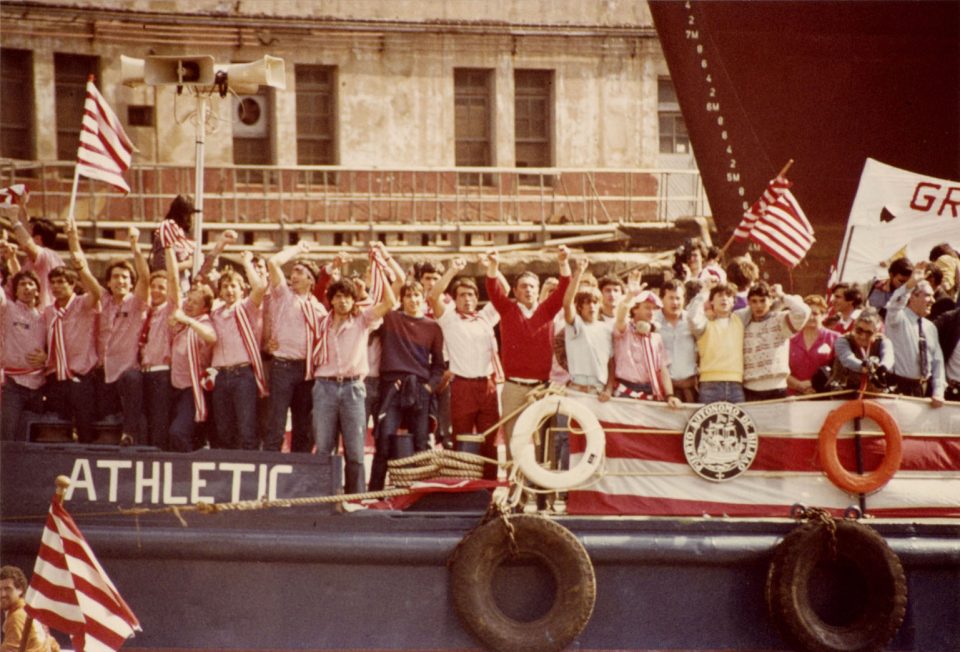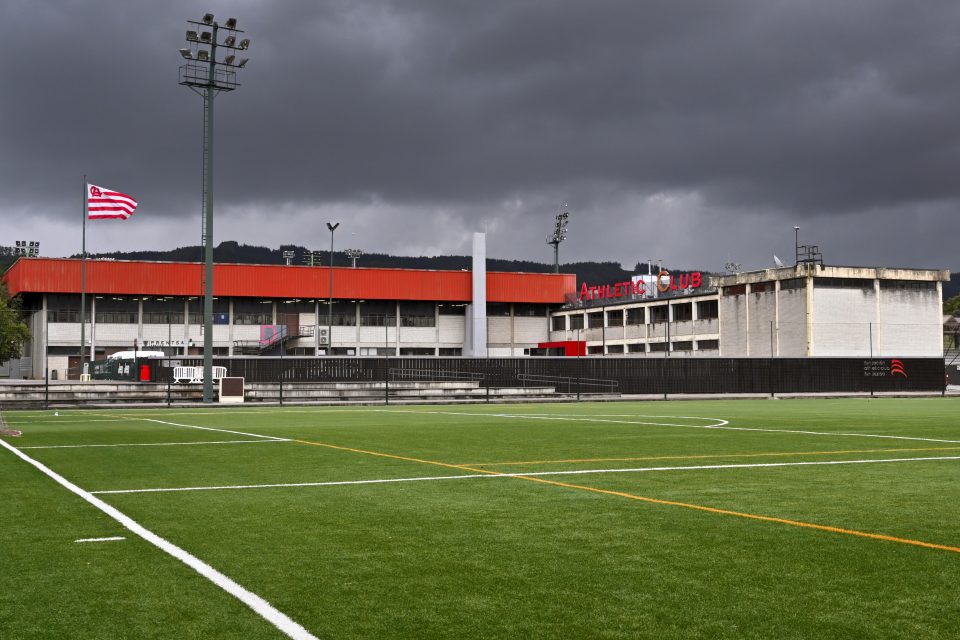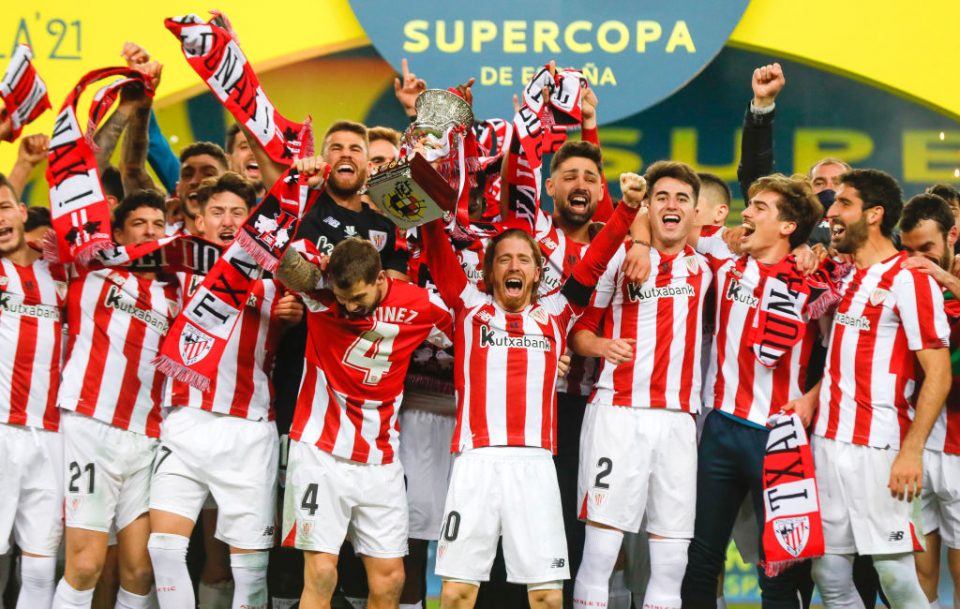Best of 2021: Athletic Bilbao’s two Copa del Rey finals, unique philosophy, and the roles of identity and loyalty in sporting success
Athletic Bilbao are mid table in LaLiga but maintain their devotion to loyalty and philosophy. Here, Frank Dalleres looks at the oldest club in the Spanish top-flight. Originally published 31 March 2021.
Athletic Bilbao manager Marcelino Garcia Toral could be forgiven for using the old cliche about every game feeling like a cup final.
That’s because, due to a quirk of pandemic rescheduling, Athletic are about to play in the final of Spain’s domestic cup competition twice in a fortnight.
On Saturday, a year later than planned, they face Basque rivals Real Sociedad in the delayed conclusion to last season’s Copa del Rey.
Two weeks later, Athletic meet Barcelona in this season’s final, where they could be made to hand back a trophy which they have waited 37 years to hold again.
It’s a unique scenario – and a head-spinning one for Marcelino and his players.
“We try to focus on what we are supposed to do in each match but I’m sure that all players keep on thinking about the finals,” he said.
Athletic are long overdue some success. They are the Spanish top-flight’s oldest club and, along with giants Barcelona and Real Madrid, the only ever-presents in LaLiga.
Yet they have not won LaLiga or the Copa del Rey since the glory days of the early 1980s, when they became back-to-back champions and did the double.
Forward Inaki Williams wasn’t born then, but has watched film of the team celebrating aboard the Gabarra, the historic barge Athletic use for trophy parades instead of an open-top bus.
“It gives you goosebumps,” he says. “Now I have the chance to win two titles. That’s what we are all dreaming about.”
Athletic Bilbao: a unique philosophy
Athletic Club – their proper name, coined by founders who took up football while studying in England – have punched above their weight thanks to and in spite of a singular philosophy.
Each and every one of their players was either born or raised in the Basque Country; since 1911, the club has refused to sign or field outsiders.
That means they rely heavily on their Lezama academy and work hard at forging strong emotional connections with local youngsters.
“For anyone born in Bilbao and its surrounding areas the main dream that children have is to play for Athletic,” says Williams.
“I think it’s a unique philosophy possibly in the entire world,” says sporting director Rafael Alkorta. “It is deeply embedded in our hearts.”

This policy, called cantera – literally meaning “quarry” – is tightly bound up with the Basque identity held so dear in the region.
Indeed, the Franco regime forced Athletic to temporarily change their name during his dictatorship because it wasn’t Spanish enough.
The club also celebrate the notion of the loyal servant with its One Club Award, handed out annually to players who have stayed true to a single team.
Matt Le Tissier was the inaugural winner in 2015, a reminder of the club’s links to Southampton, whose shirts their red and white stripes are based on.
“Loyalty is one of the main elements of our work,” says Alkorta. “What we are trying to build is that children from a very early age only want to play with us.”
‘Your colleagues are more like family’
Athletic’s emphasis on loyalty to a club and wider regional identity has been very successful in retaining their top talent.
Spain international Williams, who was born in Bilbao to Ghanaian parents, is a case in point.
The 26-year-old signed a nine-year contract in 2019, effectively pledging his career to the team.
“When I was a young child on the football pitch I dreamed about playing in San Mames [the club’s stadium]. I’m very lucky because this dream has come true,” he says.
“Each match is like a struggle with your colleagues but they are more like family.
“We know how difficult it is to compete against the rest of the teams, but our philosophy is what makes us different and proud to be Athletic players.”

A policy of restricting your talent pool to four per cent of the country’s population is hardly a competitive advantage, though.
As strong as the bonds between fans, players and club are, some of Athletic’s biggest talents have left for greater things.
Javi Martinez has won two Champions Leagues and eight Bundesliga titles at Bayern Munich. Aymeric Laporte, Ander Herrera and Kepa Arrizabalaga made big-money moves to England.
It is not a new phenomenon: former defender Alkorta left Bilbao for Real Madrid, where he won two league titles before returning and, later, taking up his current role.
“The loyalty is very difficult nowadays,” he says. “We have lots of scouts coming to see our players.”
‘Trophies are important for us to believe in what we’re doing’
Winning trophies, then, would not just represent a welcome return to former glories.
It would also serve as a reminder to current and future players that they need not leave Athletic to fulfil their ambitions.
It might even breathe new life into a culture that, admirable though it may be, seems at odds with the prevailing forces in football and the wider world.
“Trophies are important for us to believe in what we’re doing and for the children to see that with this approach you can beat Barcelona and Real Madrid and win,” says Alkorta.

Athletic took a first step by winning minor silverware in the Supercopa in January, beating both of Spain’s big two on the way.
For Williams, whose extra-time goal clinched that title, lifting trophies with his boyhood club – and getting to celebrate with a cruise on the Gabarra – is all he could have wished for.
“If you win together with your friends and family things are even better,” he says.
Watch Athletic Club on LaLigaTV, available in the UK as part of the Premier Sports pack: premiersports.com/subscribenow
For all the latest Lifestyle News Click Here
For the latest news and updates, follow us on Google News.

